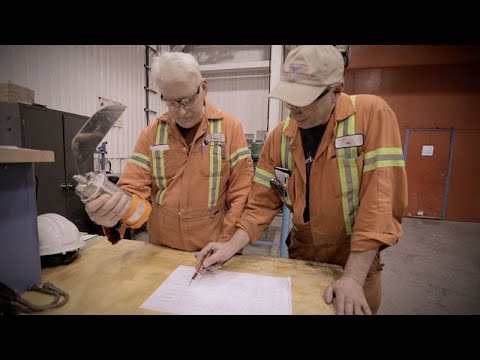Career Overview
Industrial instrument technicians and mechanics repair, maintain, calibrate, adjust, and install the dials, sensors and other instrumentation that measures and controls machinery in industrial and commercial plants. Instrumentation gives operators information about the condition and operation of machinery, ensuring the safety and function of the plant or system.
People in this occupation:
- Are employed by pulp and paper processing companies, hydro power generating companies, mining, petrochemical and natural gas companies, industrial instrument and other manufacturing companies, health services and industrial instrument servicing establishments
- Benefit from having a knowledge of electronics, physics, mathematics and chemistry
- Should have an interest in the scientific and technical aspects of machinery and industrial processes
- Must have troubleshooting abilities, problem solving skills and an attention to detail
- Must have a well-rounded knowledge of industrial production processes, controls and power systems such as pneumatics, electro-pneumatics, hydraulics, electricity, electronics, computers and networks
Job Titles
Duties
Industrial instrument technicians and mechanics:
- Consult manufacturer's manuals, circuit diagrams and blueprints to determine tests and maintenance procedures for instruments used for measuring and controlling flow, level, pressure, temperature, chemical composition and other variables in manufacturing and processing
- Inspect and test operation of instruments and systems to diagnose faults using pneumatic, electrical and electronic testing devices and precision measuring instruments
- Repair and adjust system components, such as sensors, transmitters, final control elements, distributed computer control systems (DCS) and programmable logic controllers, or remove and replace defective parts
- Calibrate components and instruments according to manufacturers' specifications
- Perform scheduled preventive maintenance work and complete test and maintenance reports
- Install control and measurement instruments on existing and new plant equipment and processes
- Consult with and advise process operators to troubleshoot process and system faults
Earnings
Earnings is income that workers receive in exchange for their labour. Depending on the type of employment, earnings can be in the form of wages (hourly), salaries (fixed monthly or annual) or self-employed earnings.
Work Environment
# Workers Employed
835% Employed Full Time
68%Industrial instrument technicians and mechanics conduct work on large production machines in industrial facilities such as refineries, mills or power plants.
These individuals may perform tasks in confined spaces, high spaces or areas exposed to noise, fumes or high heat levels. Workers may also be required to work outdoors with exposure to varied weather. Safety precautions minimize risks, which may include electric shock, exposure to dangerous chemicals or materials under high pressure.
Employment is generally full time and year round. These technicians and mechanics work regular hours or shift work and may be called upon during emergencies, such as when manufacturing and power control systems instrumentation fails to work. During emergencies, equipment may be damaged, fires have the potential to break out and valuable raw materials could be lost, so workers are often required to concentrate in urgent or stressful situations.
Workers must be familiar with developments in their area of specialty and often retrain or upgrade skills to keep up with rapid changes in technology.
Career Pathways
Career path information is currently not available.
Occupational Interests
It’s important to understand what kinds of occupations align with your interests.
For more about occupational interests visit Skills for the Future Workforce > Characteristics.
Here are the top occupational interest(s) for this career profile:
Education, Training and Skills
Industrial instrument technicians and mechanics must complete secondary school, including Math 11, and physics and chemistry courses are also recommended.
In B.C., there is no requirement that industrial instrument technicians or mechanics be certified, however, certification or apprenticeship can offer more well-rounded training and possibly increased employment opportunities.
SkilledTradesBC's Certificate of Qualification as an industrial instrument mechanic requires completion of a four-year program of in-school and work-based training or a four-year apprenticeship program in industrial instrumentation. Those who complete a formal apprenticeship also receive a Certificate of Apprenticeship.
The final assessment for each of these routes is the Inter-provincial Red Seal written examination.
Certified Journeypersons may apply to the Applied Science Technologists and Technicians of British Columbia (ASTTBC) for registration as Certified Technicians and may be required to take additional coursework (i.e. math, communications, business).
Individuals with at least seven years of full-time experience as an industrial instrument technician or mechanic or qualifications from another province may write a challenge exam. Those who pass this exam will receive the B.C. Certificate of Qualification and the Interprovincial Standard Red Seal Endorsement. Individuals working in the oil and gas industry should also have completed H2S Alive and Industrial First-Aid, Level 1
For more information please see the SkilledTradesBC website at: www.skilledtradesbc.ca.
Trades training resources
Visit our trades training page at www.workbc.ca/trades to learn about apprenticeship and trades training in B.C.
Education programs in B.C.

Top Skills
Every job calls for a certain set of skills. Knowing those skills is the first step in finding a good career fit.
Here, you will find the 10 most relevant workplace skills. Some are more important to achieving success in a certain career than others. These skills may come naturally to you or you may need to gain them through education, training and experience.
See the list of work-related skills below, ranked in order of importance for this career. Check out the list and see if this career matches your skills—take that first step!
Performing routine maintenance on equipment and determining when and what kind of maintenance is needed.
Controlling operations of equipment or systems.
Watching gauges, dials or other indicators to make sure that a machine is working properly.
Repairing machines or systems using the needed tools.
Determining causes of operating errors and deciding what to do about it.
Conducting tests and inspections of products, services or processes to evaluate quality or performance.
Using logic and reasoning to identify the strengths and weaknesses of alternative solutions, conclusions or approaches to problems.
Understanding how new information could be used to solve current and future problems in making decisions.
Determining the kinds of tools and equipment needed to do a job.
Keeping track of and assessing your performance, other individuals, or organizations to make improvements or take corrective action.
Labour Market Statistics
Discover data, facts and information that have been gathered and analyzed. Learn about the characteristics of the economy and labour market in B.C.
Employment
Find out about employment types and trends by region and industry.
Employment
835Employment by Region







| Region | Employment | % Employment of this Occupation |
|---|---|---|
| Cariboo | 80 | 9.6% |
| Kootenay | 100 | 12.0% |
| Mainland/Southwest | 200 | 24.1% |
| North Coast and Nechako | 10 | 1.2% |
| Northeast | 155 | 18.7% |
| Thompson-Okanagan | 125 | 15.1% |
| Vancouver Island/Coast | 155 | 18.7% |
Labour Market Outlook
The B.C. Labour Market Outlook is a 10-year forecast of the expected supply and demand for labour in the province. It’s usually updated every year. The purpose is to provide British Columbians with the knowledge to make informed decisions on careers, skills training, education and hiring.
Forecasted Job Openings (2025-2035)
310Forecasted Job Openings
Forecasted Employment Growth Rate
Composition of Job Openings
Job Openings by Region (2025-2035)







| Region | Job Openings | Avg. Annual Employment Growth |
|---|---|---|
| Cariboo | 20 | -0.4% |
| Kootenay | 50 | 0.5% |
| Mainland/Southwest | 80 | 1.1% |
| North Coast and Nechako | Not available | Not available |
| Northeast | 50 | 0.3% |
| Thompson-Okanagan | 60 | 1.3% |
| Vancouver Island/Coast | 60 | 0.1% |
Industry Highlights
Learn about the opportunities in B.C.'s major industries, including employment trends, earning potential, locations of work and more.
Forecasted Job Openings by Industry
| Industry | Job Openings (2025-2035) |
|---|---|
| Mining and Oil and Gas Extraction | 110 |
| Manufacturing | 80 |
| Professional, Scientific and Technical Services | 50 |
| Construction | 20 |
| Public Administration | 10 |
Insights from Industry
Job openings will arise due to both retirement and the creation of new jobs. However, due to the relatively small number of individuals employed in this group, the total number of new openings that arise in the upcoming years will be relatively few.
There is expected to be increased demand in this area as a number of new projects are anticipated. There is presently a shortage of skilled workers and new graduates available in B.C. to fill openings that arise. However, companies in Alberta often offer to transport workers across the border and charge a lower rate. This helps to supply the demand, but may also take positions away from local workers.
The industrial instrumentation industry reports an urgent need for more skilled and qualified control technicians. There is currently a high employment rate for graduates of these programs.
Demand is reported to be in the pulp and paper, and mining, oil and gas industries. New jobs are also expected to also open up in instrument service and sales companies, the heating and ventilating field, and in environmental and pollution control.
The most successful individuals in this occupation will focus on professional development and keeping up-to-date with changes in technology.
Resources
-
Applied Science Technologists and Technicians of BC (ASTTBC)www.asttbc.org
-
Canadian Institute of Mining, Metallurgy and Petroleum (CIM)www.cim.org
-
Careers in Oil + Gaswww.careersinoilandgas.com
-
International Society of Automationwww.isa.org
-
Interprovincial Standards Red Seal Programwww.red-seal.ca
-
SkilledTradesBCskilledtradesbc.ca/








